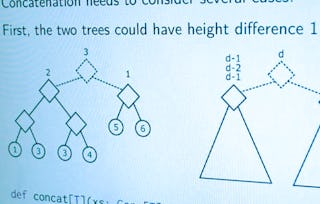With every smartphone and computer now boasting multiple processors, the use of functional ideas to facilitate parallel programming is becoming increasingly widespread. In this course, you'll learn the fundamentals of parallel programming, from task parallelism to data parallelism. In particular, you'll see how many familiar ideas from functional programming map perfectly to to the data parallel paradigm. We'll start the nuts and bolts how to effectively parallelize familiar collections operations, and we'll build up to parallel collections, a production-ready data parallel collections library available in the Scala standard library. Throughout, we'll apply these concepts through several hands-on examples that analyze real-world data, such as popular algorithms like k-means clustering.

Parallel programming

Parallel programming
This course is part of Functional Programming in Scala Specialization


Instructors: Prof. Viktor Kuncak
61,320 already enrolled
Included with
1,844 reviews
Skills you'll gain
Details to know

Add to your LinkedIn profile
See how employees at top companies are mastering in-demand skills

Build your subject-matter expertise
- Learn new concepts from industry experts
- Gain a foundational understanding of a subject or tool
- Develop job-relevant skills with hands-on projects
- Earn a shareable career certificate

There are 4 modules in this course
We motivate parallel programming and introduce the basic constructs for building parallel programs on JVM and Scala. Examples such as array norm and Monte Carlo computations illustrate these concepts. We show how to estimate work and depth of parallel programs as well as how to benchmark the implementations.
What's included
9 videos5 readings3 programming assignments
We continue with examples of parallel algorithms by presenting a parallel merge sort. We then explain how operations such as map, reduce, and scan can be computed in parallel. We present associativity as the key condition enabling parallel implementation of reduce and scan.
What's included
6 videos2 programming assignments
We show how data parallel operations enable the development of elegant data-parallel code in Scala. We give an overview of the parallel collections hierarchy, including the traits of splitters and combiners that complement iterators and builders from the sequential case.
What's included
5 videos2 programming assignments
We give a glimpse of the internals of data structures for parallel computing, which helps us understand what is happening under the hood of parallel collections.
What's included
5 videos2 programming assignments
Earn a career certificate
Add this credential to your LinkedIn profile, resume, or CV. Share it on social media and in your performance review.
Instructors

Offered by
Explore more from Software Development
 Status: Preview
Status: PreviewÉcole Polytechnique Fédérale de Lausanne
 Status: Free Trial
Status: Free TrialRice University
 Status: Free Trial
Status: Free TrialRice University
Why people choose Coursera for their career

Felipe M.

Jennifer J.

Larry W.

Chaitanya A.
Learner reviews
- 5 stars
59.59%
- 4 stars
28.14%
- 3 stars
9.21%
- 2 stars
2.22%
- 1 star
0.81%
Showing 3 of 1844
Reviewed on Jun 21, 2016
Very good. Only things I wish were better is more comments in some assignments and more prepared tests. Also I miss not having "Statement of Accomplishment" like some other Scala courses :-(.
Reviewed on Mar 28, 2018
For this course you should have Advanced English level. Cause sentesce construction is so difficult and words so unusual that i had to some times google what i have to do.
Reviewed on Mar 31, 2017
Its a very good course! perhaps the in the practice code, before jumping into the problems they can provide a couple of simple examples/questions such that the main ideas are learnt.

Open new doors with Coursera Plus
Unlimited access to 10,000+ world-class courses, hands-on projects, and job-ready certificate programs - all included in your subscription
Advance your career with an online degree
Earn a degree from world-class universities - 100% online
Join over 3,400 global companies that choose Coursera for Business
Upskill your employees to excel in the digital economy
Frequently asked questions
To access the course materials, assignments and to earn a Certificate, you will need to purchase the Certificate experience when you enroll in a course. You can try a Free Trial instead, or apply for Financial Aid. The course may offer 'Full Course, No Certificate' instead. This option lets you see all course materials, submit required assessments, and get a final grade. This also means that you will not be able to purchase a Certificate experience.
When you enroll in the course, you get access to all of the courses in the Specialization, and you earn a certificate when you complete the work. Your electronic Certificate will be added to your Accomplishments page - from there, you can print your Certificate or add it to your LinkedIn profile.
Yes. In select learning programs, you can apply for financial aid or a scholarship if you can’t afford the enrollment fee. If fin aid or scholarship is available for your learning program selection, you’ll find a link to apply on the description page.
More questions
Financial aid available,


